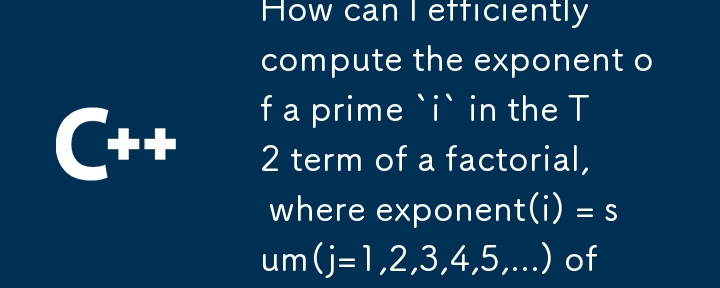

The problem in the question is to find a fast way to compute the T2 term in the expression for fast exact bigint factorial. The T2 term is defined as:
This is already pretty fast, and with some programming tricks the complexity nears ~ O(log(n)).
To be clear, my current implementation is this:
longnum fact(const DWORD &x)
T2 = (4N)! / (((2N)!).((2N)!))
(4N)! = (((2N)!).((2N)!)).T2
T2 = T2 * N!
4! = 2!.2!.(2^1).(3^1) = 24
8! = 4!.4!.(2^1).(5^1).(7^1) = 40320
12! = 6!.6!.(2^2).(3^1).(7^1).(11^1) = 479001600
16! = 8!.8!.(2^1).(3^2).(5^1).(11^1).(13^1) = 20922789888000
20! = 10!.10!.(2^2).(11^1).(13^1).(17^1).(19^1) = 2432902008176640000
24! = 12!.12!.(2^2).(7^1).(13^1).(17^1).(19^1).(23^1) = 620448401733239439360000
28! = 14!.14!.(2^3).(3^3).(5^2).(17^1).(19^1).(23^1) = 304888344611713860501504000000
32! = 16!.16!.(2^1).(3^2).(5^1).(17^1).(19^1).(23^1).(29^1).(31^1) = 263130836933693530167218012160000000
36! = 18!.18!.(2^2).(3^1).(5^2).(7^1).(11^1).(19^1).(23^1).(29^1).(31^1) = 37199332678990121746799944815083520000000
40! = 20!.20!.(2^2).(3^2).(5^1).(7^1).(11^1).(13^1).(23^1).(29^1).(31^1).(37^1) = 815915283247897734345611269596115894272000000000
T2(4N) = multiplication(i=2,3,5,7,11,13,17,...) of ( i ^ sum(j=1,2,3,4,5,...) of (4N/(i^j))-(2N/(i^j)) )
The above is the detailed content of How can I efficiently compute the exponent of a prime `i` in the T2 term of a factorial, where exponent(i) = sum(j=1,2,3,4,5,...) of (4N/(i^j)) - (2N/(i^j))?. For more information, please follow other related articles on the PHP Chinese website!
 mysql default transaction isolation level
mysql default transaction isolation level
 What is digital currency
What is digital currency
 The difference between arrow functions and ordinary functions
The difference between arrow functions and ordinary functions
 Clean up junk in win10
Clean up junk in win10
 special symbol point
special symbol point
 What keys do arrows refer to in computers?
What keys do arrows refer to in computers?
 How to use the Print() function in Python
How to use the Print() function in Python
 There is an extra blank page in Word and I cannot delete it.
There is an extra blank page in Word and I cannot delete it.




